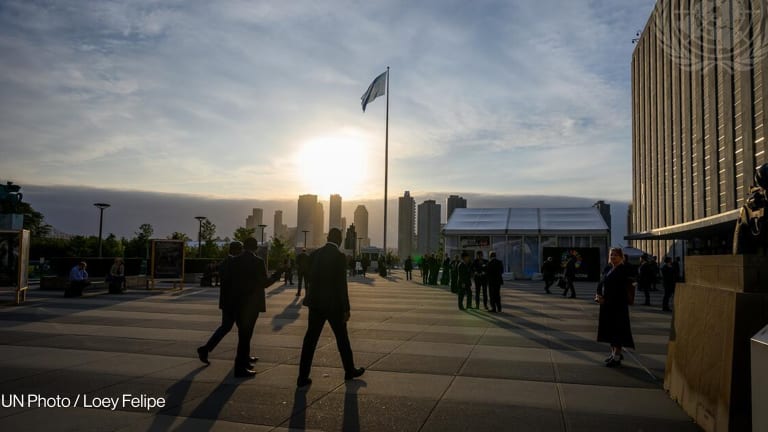WASHINGTON — The COVID-19 response has, in many ways, been a story of two United Nations — the political and the operational — according to United Nations Development Programme Administrator Achim Steiner.
“In a sense, we've seen two U.N.s operate side by side over the last six to eight months. There is the political U.N. — the General Assembly, the Security Council, and all the bodies associated with it — that clearly, in the current struggle to find a collective response, are also a reflection of the state of our world,” Steiner told Devex in an interview.
How is COVID-19 affecting progress on the SDGs? Will online meetings mean greater international representation? Our reporters are covering the all-virtual 75th United Nations General Assembly to find out.
But then there is also the operational side — the World Health Organization, the humanitarian institutions, and the development system — where the past six to eight months “have been an extraordinary moment of demonstrating how, with agility and the capacity and resilience, we have actually been part of the backbone of a world's response to COVID-19, particularly for those countries who rely on support.”
UNDP is working with U.N. resident coordinators in countries around the world to examine the socioeconomic impact of the pandemic and try to understand how the response to the crisis could lay the foundation for future development. It has completed or has assessments close to completion in 114 countries, “and they are truly giving us many causes for grave concern,” he said.
COVID-19 has “revealed, in a brutal manner, the inconsistencies and incongruence of our social, economic social safety nets,” Steiner said. “It is a moment of realization and revelation, because the vulnerabilities that we see now and the tensions, the debates, the conflicts around how to deal with this crisis clearly point to most countries, in one way or another, not being sufficiently prepared.”
One of the lessons learned thus far is that it is not just a matter of funding, but that countries need help dealing with the most immediate and difficult choices, particularly around how to stabilize livelihoods. Prior to the pandemic, 4.4 billion people had no social protection, and the coronavirus has exposed this vulnerability, he said. Funding though, still remains a major issue.
The Group of 20 and Organisation for Economic Co-operation and Development nations have not responded to mobilize a global response that mirrors their domestic responses and have fallen short on a variety of issues, including their response to debt challenges and debt relief, Steiner said.
Debt plays a critical role in how countries can finance critical development needs. Find out why it matters, how it works, and what's at stake now in this video explainer.
“The response in financial and fiscal terms so far is inadequate. It's probably irresponsible and ultimately self-defeating, because we are not only witnessing the inability of many poorer economies to really be able to cope both with a health crisis but also with economic and social fallout. We are seeing a mounting debt problem,” he said.
The world’s wealthier countries need to better mobilize resources to the level of need, and they need to look beyond the G-20 debt suspension initiative to consider how debt relief is structured, Steiner said.
A UNDP analysis found that it would only take about one-third of total debt repayments and interest payments owed by “developing countries” this year to finance a six-month temporary basic income for the world’s most vulnerable people, he said.
“You realize how enormous this issue of debt is in actually being able to either manage our way out of this crisis or to be overrun by it,” Steiner said.
“The response in financial and fiscal terms so far is inadequate. It's probably irresponsible and ultimately self-defeating.”
— Achim Steiner, administrator, United Nations Development ProgrammeCOVID-19 has also accelerated conversations about digitalization and the importance of connectivity, he said. The U.N secretary-general’s Task Force on Digital Financing of the Sustainable Development Goals released a report last month examining how digital finance is changing the nature of SDG financing.
“The transformational and almost revolutionary dimensions of this are undeniable. We have enormous opportunities. But as always with a technology, you have to shape an ecosystem. You have to create a regulatory framework. You have to protect citizens also. And you have to … create a social license to operate to make it inclusive rather than exclusive,” Steiner said.
Here, too, COVID-19 has exposed disparities, and governments will need to take bold action to address connectivity challenges, such as Indian Prime Minister Narendra Modi’s commitment last month to connect hundreds of thousands of villages within 1,000 days, he said.
“These are the kinds of generational crisis response investments that actually governments all over the world should be thinking about because they are the next drivers of development recovery,” Steiner said.









